How to be a Supportive Palestinian Ally & Understanding the History of Al Nakba
Current Events
|
May 18, 2022
|
7 MIN READ
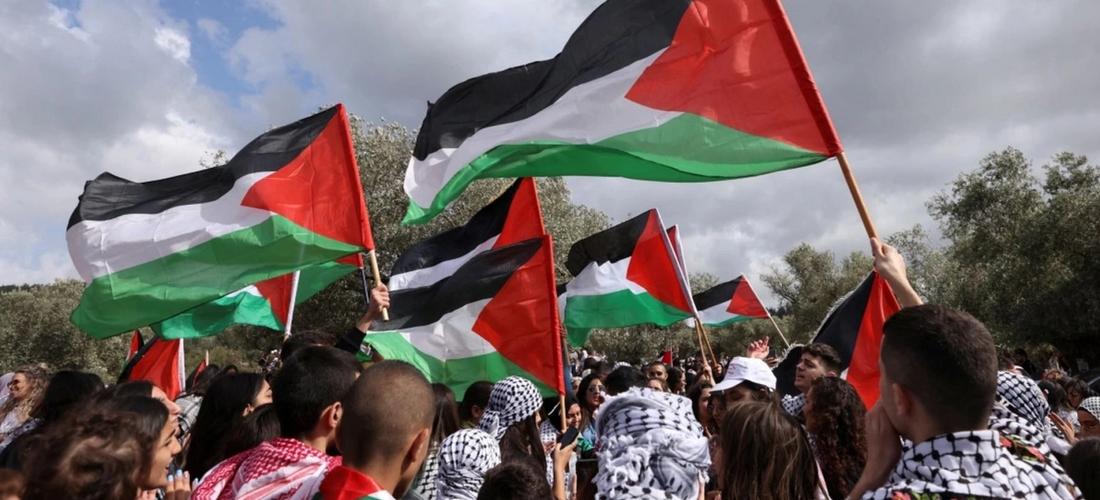
There’s a funny saying that goes, “Palestinians will always make sure to tell you where they are from.”
It’s true.
Palestinians are one of the most patriotic groups of people you will meet, and we will proudly announce our identity as part of introducing and expressing ourselves. This habit can be funny and sometimes taken to an extreme that may be off-putting to some.
But if you take a moment to unpack why this is engrained in Palestinian culture, you will find that this nationalistic pride is rooted in a devastating history of Israeli occupation and attempted erasure of Palestinian culture and identity. To combat this, displaced and occupied Palestinians make sure others know who they are.
May is an especially difficult month for Palestinians as it is the annual anniversary of Al Nakba, The Catastrophe (in Arabic). The Nakba “marks the original dispossession and expulsion of Palestinians from their homeland 74 years ago. Nakba also describes the experience of refugees still living under occupation and blockade, through war and displacement – unable to exercise their basic rights and return to their ancestral homes.” (UNRWA USA, 2022)
Why is Al Nakba something Palestinians annually remember and mourn? Let’s understand the history a little bit.
74 Years (and Counting) of Occupation, Expulsion and Erasure
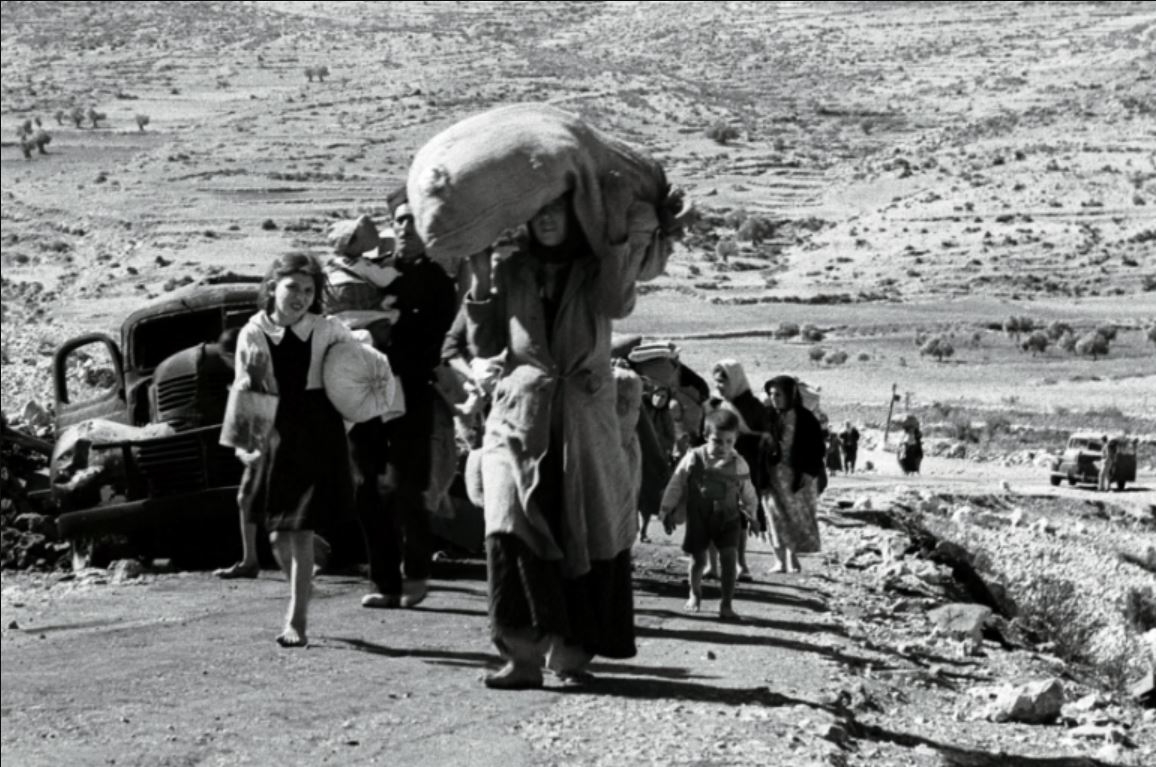
Palestinians in 1948, five months after the creation of Israel, leaving a village in the Galilee; image source: Al-Jazeera and Reuters.
While the official date of Al Nakba is May 15, 1948, after Israel declared its establishment in Palestine, the process of ethnic cleansing started years before. During the British Mandate in July of 1922, British occupiers incorporated principles of the Balfour Declaration in order to make way for the Israeli state, a practice that continues on to this day. In reality, we as Palestinians believe that the Nakba started years before 1948 and never ended.
In fact, by May 15, 1948, “half of the total number of Palestinian refugees had already been forcefully expelled from their country.” according to this 2017 Al Jazeera article. This year, on May 15, 2022, Palestinians mourn 74 years of continuous occupation, displacement, expulsion, murder, unjust imprisonment and systematic erasure from their homeland.
This is an interactive video highlighting the timeline and major events that led up to Al Nakba. I also strongly recommend watching the documentary, 1948 Creation & Catastrophe. It gives a thorough timeline of what happened during Al Nakba and is narrated by many Al Nakba survivors.
It’s not about religion, it’s about human rights.
Palestine as a land holds religious significance and is deeply rooted in the beliefs of those affiliated in the three Abrahamic religions: Islam, Christianity and Judaism. The city is mentioned in each of their holy books. In fact, for centuries, these three groups of people lived harmoniously in Palestine without conflict. It’s worth noting that Judaism does not equate to Zionism, although most Zionists claim to practice the Jewish faith.
For this reason, it is important to be aware of false claims and propaganda around the Israeli occupation being a religious conflict. On the contrary, it is a human rights issue that does not discriminate between Palestinians regardless of their religious background.
The most common tactic used by the Israeli occupation is to heighten attacks and aggression around the times of religious holidays and historic events, such as Al Nakba. The occupation is notorious for breaking international law without being held accountable. One of the most recent instances of such violations was the murder of the renowned Al Jazeera reporter and journalist Shireen Abuakleh, who was killed (according to eyewitness testimony) by an Israeli sniper while wearing her press vest and helmet covering a story in the West Bank city of Jenin.
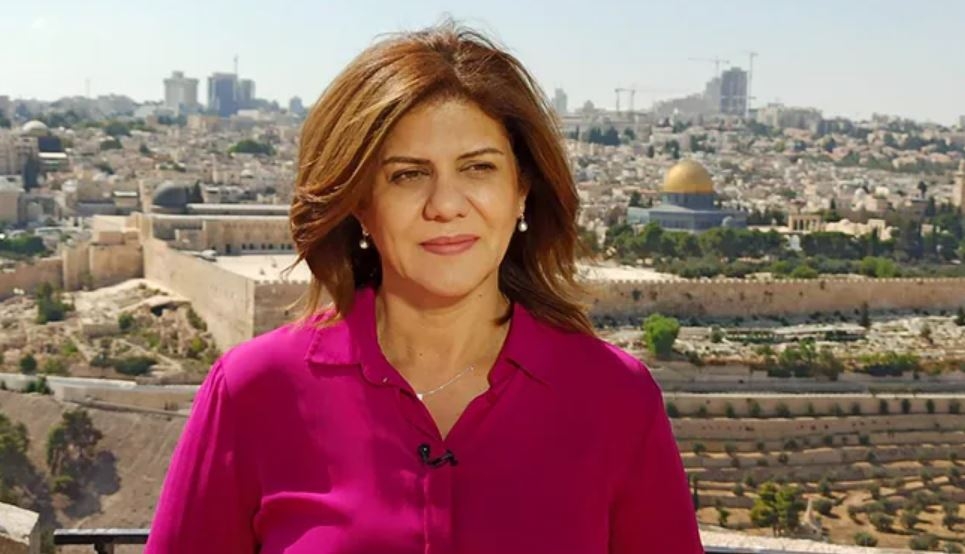
Shireen Abu Akleh, image source: Twitter
The murder of Shireen (a Palestinian Christian) shook the Arab world due to her legacy and impact as a veteran journalist covering Israeli attacks and campaigns on the ground for generations. She was a trailblazer who gave a voice to the voiceless by documenting the dire situation of Palestinians living under Israeli occupation and facing Israeli police brutality.
Her death was followed by a three-day procession where Christian and Muslim Palestinian mourners were violently attacked by Israeli police as they carried her body through the procession for burial.
Suffice to say, to be Palestinian is to be filled with the brutal history of our people, which we will not allow to be forgotten. In recent years, our plight and activism have received more support as we fight to push the media for fair coverage and more. Being a Palestinian ally is a crucial part of the Palestinian struggle and resistance.
For 74 years, the voices of Palestinians have not been enough to shake the world and bring change to the human crisis happening in my homeland. While we will continue to stand up for our country, we also rely on trusted non-Palestinian allies to shed light, educate others and support us on our road to our Right of Return.
So, what can you – if you choose to be a Palestinian ally – do to support your Palestinian friend and community?
Do your research, check your news sources and find local activist groups.
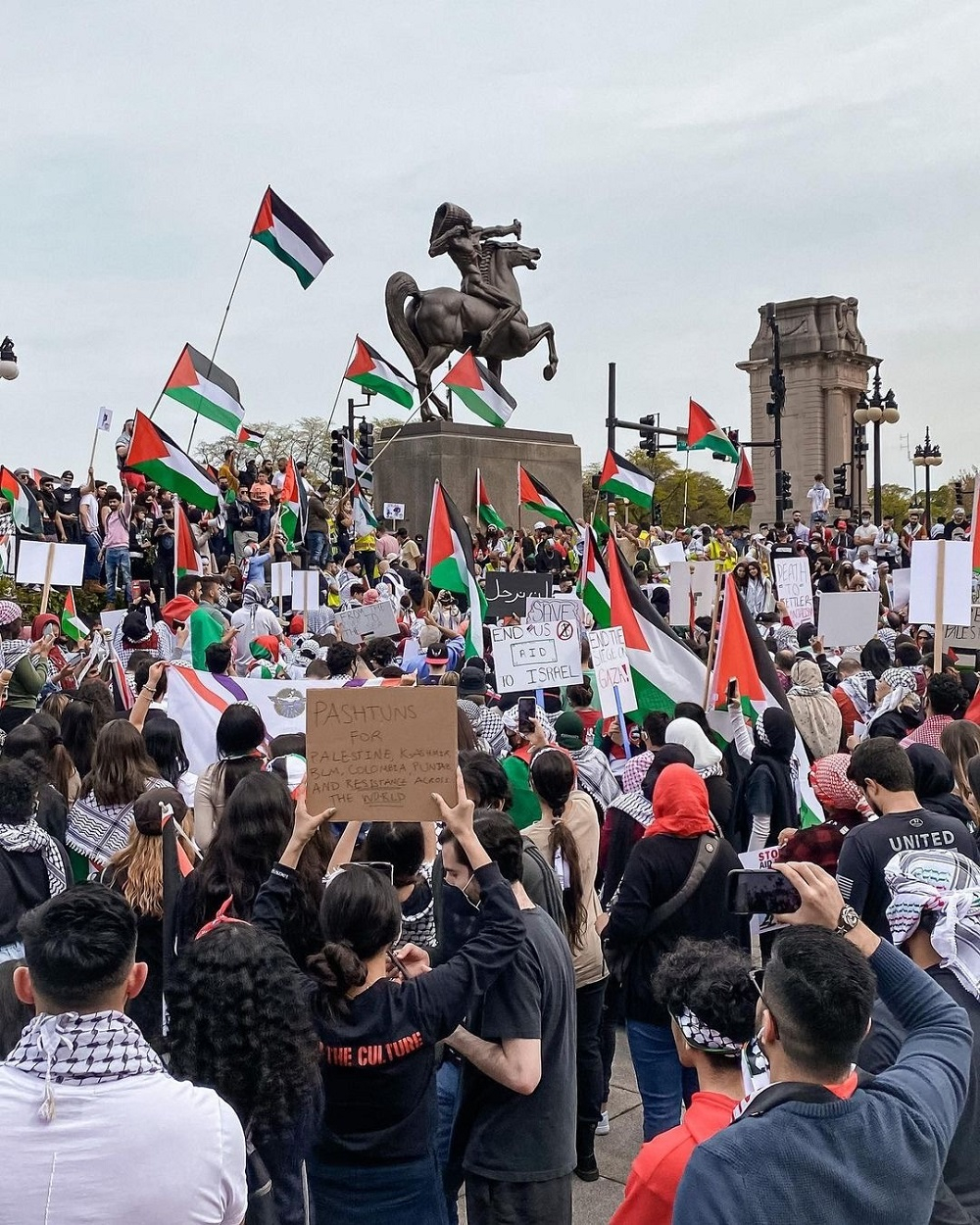
A protest for Palestine in Chicago; image source: Bayan Fares
We are tired of informing and educating others about our plight. Taking time to do some research on the history of Palestine and the creation of Israel is a crucial first step in becoming an ally and supporting your fellow Palestinian. We are here to answer questions and share personal stories, but it has become a burden to always educate others on our situation for the past 74 years.
An important part of research is to always check your news sources. How the media reports on Israeli-Palestinian stories vastly differs from one outlet to another. The words used in conveying headlines and information shape what readers think. Muslims living in Western society understand this due to how Muslim stories are reported. Similarly, this has always been the situation when it comes to news stories covering the Israeli occupation in Palestine.
Find local activist groups for allies who want to be more involved in planning actions or in attending protests or events that actively support the movement. As you educate yourself as an ally, you can also take on educator roles for other non-Palestinians, if that is acceptable to and welcomed by the Palestinians to whom you are an ally.
Also, a commonly used phrase to describe the occupation is “Israeli-Palestinian struggle.” The current situation is not a struggle between two entities. It is a colonial project of ethnic cleansing, military occupation and apartheid that has been happening for 74 years. With the rise of social media use as a means to document events, I personally rely on Instagram accounts from Palestinians living in Palestine and Middle East-based news outlets for the most up-to-date and trusted news.
Here’s a list of IG accounts to get you started:
- Abdalafo Bassam
- AJ+
- Al Jazeera
- American Muslims for Palestine
- Eye On Palestine
- Eye On Palestine 2
- Institute for Middle East Understanding (IMEU) | Instagram: IMEU
- Key48
- MetrasGlobal
- Mohammed ElKurd
- Muna ElKurd
- Middle East Eye Instagram: MEE
- Save Silwan
- Sheikh Jarrah Units Official
- Subhi Taha
- The United Nations Relief and Works Agency for Palestine Refugees UNRWAUNRWA USA
Support Palestinian creatives.
Palestinians have a rich history of talents. From culinary arts, to ceramics, agriculture, architecture, poetry, textile making, embroidery and more, the list is endless. Palestinians are proud of their handiwork and have adapted their talents to their ever-changing living situations as a form of resistance to their ethnic cleansing.
While I am proud to see so many Palestinians in the diaspora showcasing their talents, I especially encourage supporting Palestinian creatives who live in Palestine or those working in partnership with Palestinian refugees and residents of Palestine to directly support their livelihood. These are items such as beautiful thobes (Palestinian traditional dress), handmade olive oil soap, tatreez (Palestinian embroidery) pieces and Palestinian apparel.
These are a few of my favorite accounts:
- Darza Studio: Instagram
- Sitti Soap: Website | Instagram
- Deerah: Website | Instagram
- Darna: Instagram
- Kissweh: Website | Instagram
- Paliroots: Website | Instagram
- Saru Fashion Website | Instagram
- Suzy Tamimi Website | Instagram
- Watan Palestine Website | Instagram
- West Bank Apparel Website | Instagram
Donate to trusted Palestinian organizations.
Sometimes finding the right organization to donate to can be difficult. However, there are several trusted organizations working hard to deliver donations and monetary aid to Palestinians. These are just a few:
- Al Makassed Islamic Charitable Society Hospital Jerusalem: Website
- Anera Website | Instagram
- Islamic Relief USA Website | Instagram
- Palestine Children’s Relief Fund Website | Instagram
- Palestine Red Crescent Society Website | Instagram
- Playgrounds for Palestine Website | Instagram
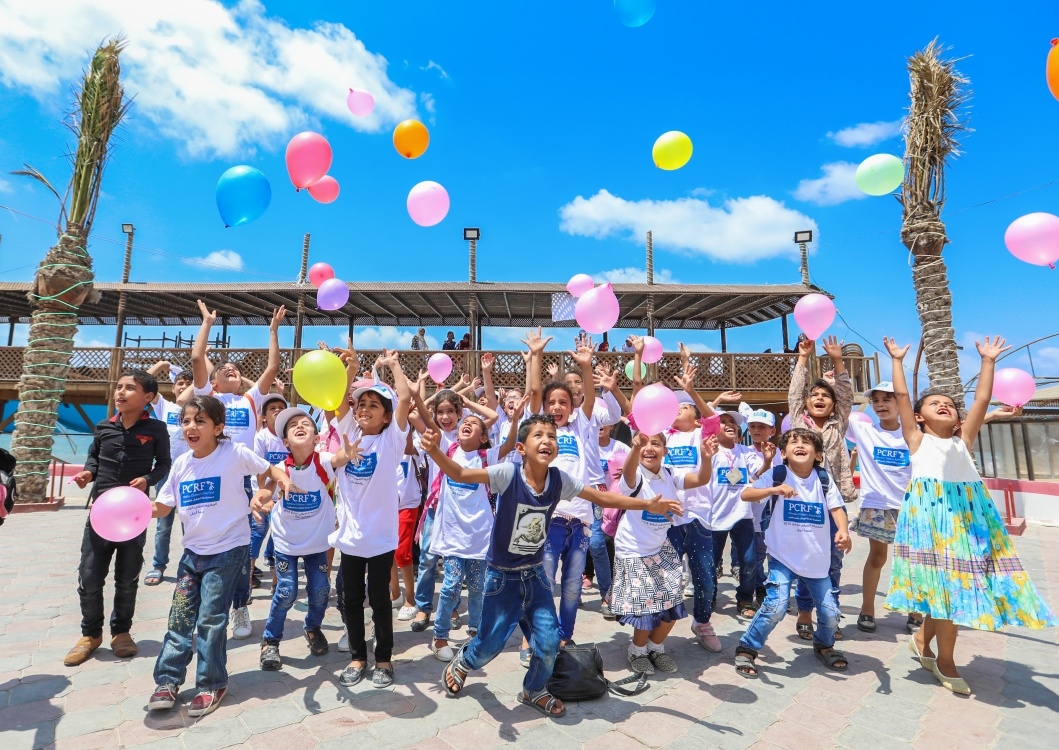
Palestinian Children Relief Fund
Educate yourself on Palestinian culture and history.
There are so many resources out there about Palestinians in the diaspora and at home reclaiming their narrative and preserving their culture. To be an ally and support the Palestinian cause is to educate and immerse yourself in Palestine’s culture and history in order to get a tangible understanding of why and how Palestinians everywhere are fighting for their freedom.
These are some of my go-to resources:
- Falastini TV
- Museum of the Palestinian People Website | Instagram
- Palestine Museum Website | Instagram
- Tatreez & Tea Website | Instagram
- The Tatreez Circle
- Tiraz Center Website | Instagram
Palestinian Children’s Book Authors:
Cookbooks:
- Arabiyya: Recipes from the Life of an Arab in Diaspora by Reem Assil
- Dine In Palestine by Heifa Odeh
- Falastin: A Cook Book by Sami Tamimi
- Palestine On A Plate by Joudie Kalla
- The Gaza Kitchen: A Palestinian Culinary Journey by Laila El-Haddad & Maggie Schmitt
- The Palestinian Table by Reem Kassis
I hope this post and these resources have inspired you to take a stance of supportive justice in the face of oppression happening in Palestine and all around the world. As Archbishop Desmond Tutu once said, “If you are neutral in situations of injustice, you have chosen the side of the oppressor.” It's important to remember this and stand up in allyship with oppressed communities around the world, from Palestinians to Rohingya Muslims to Ughyur Muslims to Muslims in India and more. May we see a free Palestine in our lifetime.
It is impossible to include all of the amazing resources we have access to; please share any I may have missed in the comments below.
Subscribe to be the first to know about new product releases, styling ideas and more.
What products are you interested in?

